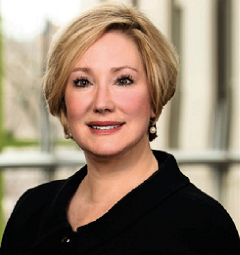- Tradetech: Part of the 4th Industrial Revolution and Why We Need to Focus on SMEs.
- 2025 Policy Outlook: Navigating Economic and Regulatory Shifts Under New Leadership
- SFNet’s 3rd Annual SFNet Cross-Border Finance Essay Contest Offers Industry Recognition, Chance to Be on SFNet Convention Panel
- Flight Rules for Risk Management - Top Takeaways from NASA's Norman Knight
- Where are they now?
A Q&A with Women Leaders in FinTech
March 1, 2019
By Eva Chaleff
Meet the Leaders In FinTech

Lin Chua
InterNex Capital
Lin Chua is the co-founder, COO and head of capital markets at InterNex Capital. InterNex Capital is a technology-enabled asset-based digital lender specializing in revolving lines of credit up to $10 million for small and midsize businesses. Lin is a seasoned structured finance / capital markets executive and business leader with over 20 years global experience. Prior to launching InterNex Capital in 2015, Lin was Managing Director at GE Capital, where she held senior leadership roles throughout nearly a decade and received multiple awards for growth. Prior to GE Capital, Lin was a transaction lawyer at Simpson Thacher and Bartlett (NY), De Brauw (Netherlands) and Freehills (Australia), covering private equity, leveraged/corporate finance and capital markets. Lin serves on the Advisory Board of Duke University’s Global Financial Markets Center, and on the Duke Law Board of Visitors. She is a member of CFA’s Women in Commercial Finance Committee and was formerly the co-Champion of GE Capital’s Asian Women initiative. Lin holds an LLM from Duke University, and an LLB (with Honors) and a BCom (accounting and economics double major) from Sydney University (Australia). Lin has lived in four continents, worked in three countries, and speaks five languages. She lives in Manhattan with her husband and her two children.

Lisa Ledbetter
Jones Day
Lisa advises domestic and international banks and nonbank financial institutions in connection with commercial and retail regulatory, transactional and enforcement matters. She assists clients with integrating federal and state laws and rules into transactions and business operations. Her practice covers innovations in financial technology and new business products and services. She is also experienced in defending enforcement actions, including responding to civil investigative demands.
Prior to Jones Day, Lisa was Deputy General Counsel of Freddie Mac, responsible for regulations, new products, investments and capital markets activities. Before that, she was deputy office director and head of regulations, legislation, finance and funding at the FDIC and banking and finance counsel at the Department of the Treasury.
Lisa is ranked as a Notable Practitioner in the 2019 Chambers FinTech Guide. She is the sole recipient of the 2018 International Law Office Client Choice Award for Banking in DC, based on outstanding reviews of legal advice and client care by senior corporate counsel, recognizing the ability to add real value to clients’ business above and beyond other market players.

Nancy Lee
ABLSoft, Inc.
Nancy is a seasoned executive with over 20 years of experience in the commercial lending and software development industries. In her current position, Nancy oversees the company direction, operations, and product strategy for the RadarOne Lending platform. She also takes a hands-on role in developing new business and partnerships.
Prior to founding ABLSoft, Nancy was one of the original team members at Sun Microsystems that created the Java Programming Language. Over her ten years with the company, she managed and launched several Java products that were instrumental in shaping the future of Web applications as we know today.
Nancy has a bachelor’s degree in economics and mass communications from the University of California, Berkeley. In her free time, she enjoys yoga, snowboarding, traveling and gardening.
To take a closer look, we interviewed some of the industry’s leading women about their experience and outlook for the FinTech industry: Lin Chua, Co-Founder and COO, InterNex Capital; Lisa Ledbetter, Partner, Jones Day; and Nancy Lee, Co-Founder & CEO, ABLSoft, Inc. All three will be panelists at SFNet’s FinTech & Innovation Forum on March 13 in New York City.
What has been the most challenging aspect of your role?
Chua: I’ve always found it important to constantly be receptive to innovation and change. This became even more pronounced at InterNex Capital, a technology-enabled asset-based lender for SMBs. My business partner Paul DeDomenico and I have created a culture that encourages our team, our investors and our friends to constantly challenge and critique what we’ve done. Thereafter, we stay prepared to pivot, innovate and adapt quickly. Change can take place in many forms — from exploring, investing in and adopting new technologies and analytics that expedite manual processes or improve user experiences, to recalibrating our business strategy to meet the needs of market segments or partners that have unique demand for our digitized lending. We urge our team to constantly ask: “Why not?” instead of “Why?”
Agility is definitely challenging, but it is also very exciting.
Lee: Managing between the rapid pace of technological advancement while addressing the broad spectrum of customer expectations can be challenging. As a software company, we are always evaluating new technologies that could potentially benefit our customers, such as better decision-making intelligence or innovative ways to improve the workflow.
Our decision on what cutting-edge technology to invest in is balanced against customer readiness. We work with a diverse set of customers with varying degrees of understanding and tolerance for adopting new technologies. There are tech-savvy lenders entering this space that expect seamless, instantaneous communications with other FinTech systems. On the other hand, many financial institutions are still taking the initial step to move to a cloud solution, with a focus on stability and proven solutions before committing to any change. We do our best to educate and to offer solutions that will improve on their current operations no matter where they sit on the spectrum.
What is the most prominent learning experience you’ve had while working in the FinTech industry?
Chua: As a lender, the fundamentals are very important. That is all the more true in the FinTech lending industry. We remind ourselves constantly that the first word in FinTech is “Fin”.
As a FinTech lender, algorithms, analytics and system integrations allow InterNex Capital to provide our borrowers with a superior user experience and real-time speed. Technology also provides InterNex Capital (as an asset-based lender) with enhanced underwriting and portfolio monitoring, as well as unique origination possibilities and partnerships.
But technology and data science do not and should not take our focus away from the “tried and tested” fundamentals. Ultimately, our borrowers will still value our exceptional customer service. InterNex Capital will also always continue to marry artificial intelligence with the sensible use of the experience of our industry veterans on all transactions.
Ledbetter: FinTech is all about continuous innovation, so working with the FinTech industry is all about continuous learning.
Lee: Learning the nuances of various secured lending practices has been important in helping me to develop and refine our application over the years. Given that lenders need to be hyper-focused on asset quality, there is an element of creativity and subjectivity needed to make good lending decisions, especially as the deals vary from industry to industry. Each lender has their own unique approach and experiences that influence their lending practice and risk tolerance.
This knowledge has helped us to identify common user functionality, which we can provide as standardized, out-of-the-box software to keep costs down for our customers. It has also enabled us to offer configurable tools for lenders that want more flexibility in their workflow and more access for deeper data analysis. And for customers that need a fully custom solution, we offer a lending platform to incrementally add functionality without having to build from scratch.
In what ways do you see digital technologies revolutionizing the relationship between lender and borrower?
Chua: With growing databases of information, system integrations, and enhanced real-time visibility, lenders are quickly learning about their customers in ways previously unavailable. Decision making is happening in unprecedented ways.
In turn, borrowers are also expecting lenders to provide them with more benefits of digital technology. This does not just mean more speed. It also means full transparency and detailed reporting.
As a result, InterNex Capital — through our Velocity portal — provides an online, digital experience that gives our borrower real-time access to liquidity through our revolving line of credit, full transparency, and the additional benefits of business intelligence and automated reporting.
Ledbetter: Technology is rewriting the relationship between lender and borrower. Every aspect of the relationship either has been or will be transformed by digital technology. Technology is transforming how, when, and to whom commercial loans are made.
Lenders are injecting digital technologies, computer-powered algorithms and artificial intelligence (AI) directly, or together with partners, into the loan application, due diligence, underwriting and closing processes, enabling borrowers to find and obtain the right financing, at the right price, faster. At the same time, borrowers are significantly expanding their own digital savvy, keeping the marketplace competitive and dynamic.
Take, for example, AI or machine learning. AI is becoming more and more integrated into the relationship between lender and borrower. AI is helping lenders and borrowers find each other, such as through deal platforms catering to particular markets, and AI is empowering lenders to understand potential borrowers by gaining meaning from larger and larger volumes of data, which can open credit opportunities and lower financing costs.
Lee: We will see greater confidence and trust in the lending relationship as well as a better, more efficient experience for all parties. Digital automation introduces consistency in both processes and calculations. In the lending process this consistency provides a security blanket to both parties that things are being done correctly every time. There eventually will be little room for ‘human error’ when submitting a borrowing base, or the lender manually reviewing reports sent from a borrower. This also means less time preparing, analyzing and arguing over information for both sides. People will rely on the software to give them the exact proper interpretation of data every time. Minimizing the human element on these types of tasks will keep everyone honest, eliminates errors and speeds things up. This, ultimately, could lead to less overhead for lenders, better rates for borrowers, and a better overall working relationship between the two.
What trends should we expect in FinTech in 2019?
Chua: We will continue to see banks and large financial services firms partner with and, in some cases, invest in or acquire smaller FinTech companies. Tenured financial services firms see FinTech as a major opportunity to deploy capital and secure their place in the emerging world of digital finance.
I also expect consumers to remain focused on privacy and security. FinTech companies will likely respond to this growing concern in their marketing and technology investments.
Ledbetter: Global investment in, and financial institutions’ partnerships with, FinTech will continue to expand in 2019 right alongside the boom in FinTech innovations. Some trends we are already seeing will continue while others will evolve and grow in new ways.
Technology is transforming commercial lending, making the process simpler, faster and more streamlined. So-called big data is likely to become even bigger in 2019 as financial institutions and FinTech companies seek to incorporate lessons learned about non-traditional credit factors into underwriting decisions.
Financial institutions around the world will continue to devote significant resources to digital transformation projects, both directly and in partnership with FinTech companies, that create and deliver new products and services through new channels.
Artificial intelligence will continue to evolve and become further integrated into financial services. In 2019, business uses of digital assistants may become more prevalent such as voice command banking and customer service.
Blockchain and other distributed ledger technology will continue to rise in prominence in 2019. Among financial institutions, distributed ledger technology is increasing in popularity because the technology updates the digital ledger in real-time while storing all records in an immutable fashion.
Lee: FinTech has been slowly transforming the financial industry for years now, starting with the economic meltdown back in 2008. Cloud computing, digital onboarding, and rapid loan processing are becoming commonplace. Digital payments using cryptocurrency, digital security using biometric authentication technology, and voice commerce are some interesting trends this year.
In the commercial lending sector, there are several key areas that will be especially impactful. One is around complete automation. We’ve seen automation of simple processes such as online advance approvals, but what we’ll see this year is total automation of key processes as well as intelligent automation that leverages machine learning and AI. Imagine being able to make a lending decision in a matter of seconds from the time the client digitally submits their borrowing base to having an updated borrower availability ready to fund an advance.
We will continue to see an even deeper and richer perspective on client financial information through big data. Think about using analytics to better identify attributes of high-risk customers or spot questionable date changes on invoices while using AI and machine learning technology to trigger a series of actionable next steps.
As mentioned by Lisa, blockchain technology is creating new opportunities in the FinTech space, given it’s a decentralized, public digital ledger that can record all transactions without risk of being corrupted. It will make it simple to authenticate the identity of a person involved in any loan processes and transactions.
For example, blockchain could enable secure lien checks or prevent a lender from funding on collateral another lender has already funded against.
What is your advice to someone seeking a career in the FinTech industry?
Chua: The innovations and possibilities in FinTech are fast developing. Read widely and keep up with news in the market.
The innovations and possibilities in FinTech are fast developing. Read widely and keep up with news in the market.
Lee: I’ve been in the technical industry for over 20 years now, but did not initially think I’d go this direction with my business degree. With the industry’s exponential growth, this is a good time to consider a role in FinTech. Aside from a software programming job where a computer science education is a must, there are many roles in FinTech where a strong business acumen and analytical skills can serve you well. Because FinTech is fast paced and immersed in uncharted territory, people who are adaptable, creative, and enjoy problem solving can thrive. There are plenty of jobs that bridge the gap between business and technical such as data analytics or product management. There are also many opportunities around marketing, sales, and project management. Regardless of the role, it’s important to know your own product and all its features well. Also, being able to pick up and learn new applications quickly is important. Make it a point to get hands-on experience by using a variety of Web and mobile applications on your own. TSL
